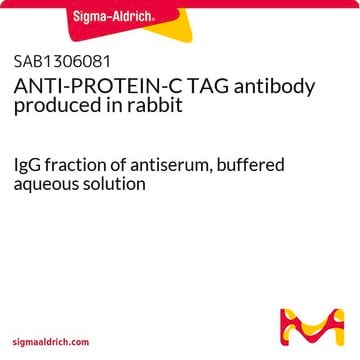P4680
Anti-Protein C antibody produced in rabbit
IgG fraction of antiserum, buffered aqueous solution
Autenticatiper visualizzare i prezzi riservati alla tua organizzazione & contrattuali
About This Item
Prodotti consigliati
Origine biologica
rabbit
Coniugato
unconjugated
Forma dell’anticorpo
IgG fraction of antiserum
Tipo di anticorpo
primary antibodies
Clone
polyclonal
Stato
buffered aqueous solution
Reattività contro le specie
human
tecniche
western blot: 1:500
N° accesso UniProt
Condizioni di spedizione
dry ice
Temperatura di conservazione
−20°C
modifica post-traduzionali bersaglio
unmodified
Informazioni sul gene
human ... PROC(5624)
Descrizione generale
Protein C (PROC) or activated protein C is a serine protease. It is expressed in the lungs. The gene encoding this protein is localized on human chromosome 2q14.
Protein C is synthesized by liver parenchymal cells as a single chain polypeptide, but in plasma, it consists mainly of a heavy chain (41 kDa) linked by a disulfide bond to a light chain (21 kDa). The plasma concentration of protein C is ~ 4 mg/mL with a half-life of about 15 hours.
Specificità
Specifically reacts with protein C in normal pooled human plasma and shows no reaction with protein C-depleted plasma.
Immunogeno
Protein C from human plasma.
Applicazioni
Anti-Protein C antibody produced in rabbit has been used to study the effects of zirconia-based stationary phase on its activity.
Anti-Protein C may be used for the immunochemical determination of protein C levels in normal and pathogenic human plasma. Determination of protein C levels can be used in the study of regulation of blood coagulation and fibrinolysis.
Azioni biochim/fisiol
Protein C (PROC) functions as a cytoprotective anticoagulant and has anti-inflammatory effects. PROC inactivates factors Va and VIIIa. The protein stabilizes the endothelial barrier and thereby reduces vascular permeability. It also modulates gene expression.
Protein C is a vitamin K-dependent plasma zymogen which plays an essential role in the regulation of blood coagulation. Activated protein C also enhances fibrinolysis by forming a complex with plasminogen activator inhibitor, thus allowing enhanced activity of plasminogen activator. Hereditary and acquired protein C deficiency states have been recognized to be associated with thrombosis. Homozygous severe protein C deficiency manifests in the new born by massive thrombosis and purpura fulminans. Heterozygotes for this entity usually do not manifest thrombosis.
Stato fisico
Solution in 0.01 M phosphate buffered saline, pH 7.4, containing 15 mM sodium azide.
Esclusione di responsabilità
Unless otherwise stated in our catalog or other company documentation accompanying the product(s), our products are intended for research use only and are not to be used for any other purpose, which includes but is not limited to, unauthorized commercial uses, in vitro diagnostic uses, ex vivo or in vivo therapeutic uses or any type of consumption or application to humans or animals.
Non trovi il prodotto giusto?
Prova il nostro Motore di ricerca dei prodotti.
Codice della classe di stoccaggio
10 - Combustible liquids
Classe di pericolosità dell'acqua (WGK)
WGK 3
Punto d’infiammabilità (°F)
Not applicable
Punto d’infiammabilità (°C)
Not applicable
Dispositivi di protezione individuale
Eyeshields, Gloves, multi-purpose combination respirator cartridge (US)
Scegli una delle versioni più recenti:
Possiedi già questo prodotto?
I documenti relativi ai prodotti acquistati recentemente sono disponibili nell’Archivio dei documenti.
Activated protein C inhibits neutrophil extracellular trap formation in vitro and activation in vivo.
Healy LD
The Journal of Biological Chemistry, 292(21), 8616-8629 (2017)
Mechanism of protein C-dependent clot lysis: role of plasminogen activator inhibitor
Sakata Y, et al.
Blood, 68(6), 1218-1223 (1986)
The protein C pathway in tissue inflammation and injury: pathogenic role and therapeutic implications
Danese S, et al.
Blood, 115(6), 1121-1130 (2010)
Activation-Resistant Homozygous Protein C R229W Mutation Causing Familial Perinatal Intracranial Hemorrhage and Delayed Onset of Thrombosis
Abdulrahman Alsultan
Thrombosis Research, 143, 17-21 (2016)
Association of common genetic variation in the protein C pathway genes with clinical outcomes in acute respiratory distress syndrome
Anil Sapru
Critical Care, 20, 151-151 (2016)
Il team dei nostri ricercatori vanta grande esperienza in tutte le aree della ricerca quali Life Science, scienza dei materiali, sintesi chimica, cromatografia, discipline analitiche, ecc..
Contatta l'Assistenza Tecnica.








